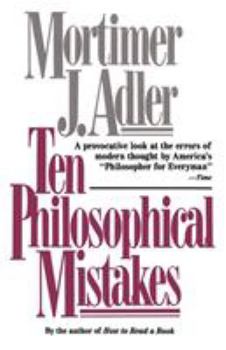Ten Philosophical Mistakes
Select Format
Select Condition 
Book Overview
Ten Philosophical Mistakes examines ten errors in modern thought and shows how they have led to serious consequences in our everyday lives. It teaches how they came about, how to avoid them, and how to counter their negative effects.
Format:Paperback
Language:English
ISBN:068481868X
ISBN13:9780684818689
Release Date:April 1997
Publisher:Touchstone Books
Length:224 Pages
Weight:0.50 lbs.
Dimensions:0.7" x 5.5" x 8.5"
Customer Reviews
4 ratings
Good Book
Published by Thriftbooks.com User , 17 years ago
I thought this book was so useful that I bought ten more copies to give to friends (interested in philosophy). It is a relatively easy read for a layman. However, Chapter Ten has serious errors.
The Importance of Philosophy
Published by Thriftbooks.com User , 21 years ago
We have all heard people say, as if it were a message from the divine, words to the effect that philosophy is either dumb or not needed and one can't make any sense from it. Mortimer Adler made it his life's work attempting to demonstrate the importance of philosophy in leading a civilized life.Adler has been criticized for his conservatism, his allegedly Euro-centric viewpoint, and his refusal to adapt many of the nouveau philosophical ideas currently floating in and out of favor. Adler demonstrated one truth: COMMON SENSE IS NOT ALL THAT COMMON. Drawing strength from Aristotles laws of logic, he traces the development of philosophical mistakes that over the course of time have been compounded into mass errors. He shows that many times it is easier to take the simpler way out, philsophically, rather than fight for the ultimate truth. Adler views humankind differently than many philosophers, seeing us as differnt in kind (rather than just degree) from the animals. And like his mentor, Aristotle, he teaches that what distinguishes us from other animals is our ability to reason and think analytically.Not only has he been involved in philosophy in general but he has also been active in applying such a viewpoint to the real world. His educational proposals have wrought incredible results when implemented. His proposals on teaching ideas have resulted in thousands of young philosophers armed with a new knowledge for facing the world.Starting in the Medieval times, he identifies several errors in philosophical thought that have changed not just how we think but how we think about ourself as individuals and as a species. Mortimer Adler is a national treasure!
Review of Adler, _Ten Philosophical Mistakes_
Published by Thriftbooks.com User , 24 years ago
Review of Adler, _Ten Philosophical Mistakes_The thesis of this book is that Western philosophy has been for the most part in serious error for the last three centuries. Many people would consider that a sufficient reason to render the well-known judgment, "I couldn't pick it up." I note, though, that E. F. Schumacher makes a very similar claim at the very beginning of _Small is Beautiful_, and that book is so popular that our local university library has three copies. And there are other such cases in which courage is rewarded.In any event, Adler's general argument is this: the important modern philosophers, beginning with Descartes, made certain errors which have had disastrous results for contemporary notions of the objects of consciousness, the nature of the human mind, the nature of language, of knowledge, of moral principles, of free will, and even the nature of happiness. Succeeding philosophers, especially Kant, instead of ferreting out these initial errors, tried instead to circumvent their consequences, thus in a sense compounding the errors. The errors were made due to ignorance on the part of modern philosophers of ancient and medieval philosophy, especially Aristotle and Aquinas. This ignorance in turn was due to the stultifying way in which the earlier doctrines were taught in late scholasticism, and also, no doubt, due to an over-zealous rejection of the past in the light of the new advances in material science.Nearly all of the errors to which Adler points consist of failing to make certain distinctions. Locke failed to distinguish between those "ideas" which are truly private and do not point to things beyond themselves - sensations, feelings, emotions - and the "true ideas" which point to public things beyond themselves - percepts, memories, images. (This distinction was made by the scholastics.) Hobbes, Hume and Berkeley failed to distinguish between intellect and sense. (This distinction was made by Aristotle and Aquinas but carried to excess by Plato, Descartes, Kant and Hegel.) Locke also made the error just mentioned, and also failed to distinguish between pure or formal signs and other signs. Kant failed to distinguish between common experience and specialized experience. Everybody since the medieval period failed to make Aristotle's distinction between practical truth and descriptive truth. Dewey failed to make the distinction between terminal goals and normative goals. And so on.Obviously it is important in each case to show that the distinction in question is not ad hoc - trumped up merely to resolve a single issue. For if we are allowed to create any distinctions we like, then nearly any position can be "refuted." Adler for the most part does note that the distinctions to which he appeals were made prior to the present difficulties, usually in ancient and/or medieval philosophy. But he does not do this in every case, and for me that is a weakness of the book. However, a single book cannot do everything
Celebration of common sense
Published by Thriftbooks.com User , 25 years ago
The previous reviewer, I'm afraid, is all wet. Adler's book points out where thinkers of the past couple of centuries have arrived at conclusions which are simply wrong (i.e. nobody really thinks that way) because of flawed premises. Instead of re-examining the premises, as Adler does, said philosophers have made absurd claims about reality.Adler's central premise is that the ancients were equipped with minds as good as ours, and therefore their philosophical conclusions deserve respect (their science is, of course, subject to correction).Adler, by the way, is a neo-Thomist.





